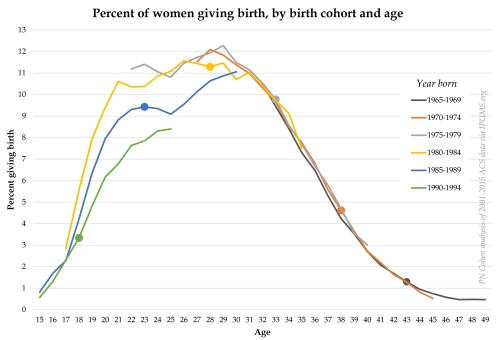Sometimes it seems like the whole of American media has conspired to dump on Millennials. When I see my own generation responding to accusations of Millennial incompetence and general horribleness, the recession tends to take center stage, along with a changing economy. Consider the number of middle aged Trump supporters angry that the well-paying union jobs of the past are in decline. Millennials are affected by these same economic changes, and the recession—and they’re frequently saddled with college debt, debt they incurred because going to college was supposed to be the solution to weathering a changing job market.
To see some tangible ways the recession has affected Millennials, let’s look at a graph created by sociologist Philip N. Cohen outlining the birth rates of three different subsets of Millennials:

As Cohen explains:
The figure below shows the birth rates by age for women across six five-year birth cohorts. The dots on each line mark the age at which the midpoint of each cohort reached 2009. The oldest three groups are supposed to be “Generation X.” The three youngest groups shown in yellow, blue, and green — those born 1980-84, 1985-89, and 1990-94 — are all Millennials…
Cohen created his graph to illustrate the dramatic differences within Millennials’ experiences as a way to challenge the common divisions of age cohorts—what do the individuals in the yellow group really have in common with those in the green group, after all? But this graph is also important in illustrating the effects of the recession on those termed Millennials, as Cohen explains:
Most of the fertility effect on the recession was felt at young ages, as women postponed births. The oldest Millennial group was in their late twenties when the recession hit, and it appears their fertility was not dramatically affected. The 1985-89 group clearly took a big hit before rebounding. And the youngest group started their childbearing years under the burden of the economic crisis, and if that curve at 25 holds they will not recover.
I’m in that blue group. I was lucky enough to be fairly insulated from the recession, but others clearly were not, and the percentage of women in my five-year cohort having children took a literal dip as people postponed these decisions.
Most of my friends, especially on Facebook (where I stay in contact with many friends from college), are Millennials. Many of them are having children right about now, in their late 20s, and my Facebook feed sometimes seems completely full of babies. But others aren’t, frequently because their work situations are unstable (especially in the gig economy) or because their careers are so demanding that they don’t feel they can.
If older Americans are concerned about Millennials’ birthrates, I have some suggestions. I’ve watched the high cost of childcare and the inflexibility of even good jobs (especially those in the tech industry) delay decisions to have children—or decide them in the negative. I’ve known people who would like to have children but feel can’t, because they’re stringing together multiple low-paying part-time jobs and can hardly make ends meet even without childcare costs.
Oh and also? Health insurance. That plays a role in these decisions as well.
Government-funded childcare, universal health insurance, paid maternity leave, a higher minimum wage—all of these things would help ensure that Millennials who want to have children feel they are able to do so. And yet, those who complain most about Millennials’ low rate of childbearing tend to be those most against the above.
Another thing that would help is a good, hard look at both the instability of the gig economy and the inhuman expectations that accompany many careers. I have friends who don’t get home from work until at least 7:00 each night. I don’t know of any daycare centers that even stay open that long. Finding childcare can be especially difficult for those working multiple part-time jobs with schedules that change from day to day or week to week.
One common narrative explaining low Millennial birth rates is that of the selfish Millennial who chooses not to have children because they don’t want the inconvenience. There are certainly Millennials who have chosen not to have children—I know some myself, and selfish is the last thing I’d call them. But most Millennials I know who haven’t had children would like to have children—they just can’t figure out a way to swing it financially. And no, it’s not because they think children need to be enrolled in every activity or going to every camp or taking horseback riding or something. It typically has a lot more to do with things like unpaid maternity leave, childcare that is more expensive than college, and unstable (or shared) housing arrangements.
I’d like to see those who are concerned about low Millennial birthrates stop pointing blame and start learning about why Millennials aren’t having babies—and how they can help ensure that those who want to have children are able to do so.
Oh, and maybe stop complaining about single mothers.
Can you see the double bind here, for Millennials? If we have children we can’t support (or struggle to support) we’re irresponsible. But if we recognize that we can’t responsibly have children, and therefore do not have children, we’re selfish and a problem.
I have a Patreon! Please support my writing!















